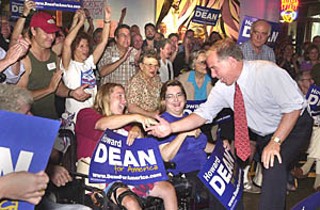Lessons of the Good Run
The Dean Campaign's Joe Trippi
By Mike Clark-Madison, Fri., March 5, 2004

The campaign might be over, but Joe Trippi's still good with a sound bite. "It's too easy for the press corps to say the Howard Dean campaign was a dot-com bust," he told the Chronicle recently. "It really was a dot-com miracle. We proved, right at the time people were throwing in the towel and saying the Internet was all hype, that the promise of the Net really was possible. Maybe Howard Dean lost this election. Maybe I did. But those 600,000 people didn't."
As most of y'all probably know, Joe Trippi was Howard Dean's campaign manager throughout the Vermont governor's brilliant run from almost-unknown fringe candidate to Democratic front-runner – and though Dean, for various reasons, will not be the Democratic nominee in November, even his detractors acknowledge he is the real success story in this race. And while Dean became a party leader on the strength of his kick-Dubya's-candy-ass message, it was Dean for America's unprecedented exploitation of the Internet that really made folks inside the Beltway pause during their chicken dinners and take notice.
Trippi – a player in insurgent Dem campaigns a generation ago (Gary Hart, Jerry Brown) whom Dean inspired to return from self-imposed political exile – is almost as much a hero to the Deaniacs as Dr. Governor (or is it Gov. Doctor?) himself, particularly to those for whom the Dean-Internet connection is more than casual. He and other principals of Dean's Internet team – visit them online at ChangeforAmerica.com – recently put in writing (the "Cummings Creek Compact") their commitment to "stay together and keep building the tools and the platform to support grassroots organizing and Internet involvement in changing the politics of this country," in Trippi's words.
Dean for America's success at raising money (more than any Democratic presidential candidate ever) and organizing supporters (more than 600,000) via the Internet was, in Trippi's view, simply the "beta version" of what's going to happen in the future. "It's still like the early days of television. Just as people today look at the McCain campaign [in 2000] as a primitive iteration of what the Dean campaign did," he says, "four years from now people will look at the Dean campaign the same way – 'Trippi and those guys thought they were so advanced, and they were so primitive.'
"McCain didn't have Meetup [the social-networking tool that helped organize, early, Deaniacs on the ground throughout the country] or other tools that are still now in their infancy," Trippi continues. "You didn't have millions and millions of Americans using credit cards on the Net. Blogs hadn't reached the critical mass that they had by 2003." And though working with a much more robust set of tools, Trippi notes that Dean for America encountered challenges that future campaigns will not. "The transparency of the Net was something we hadn't thought about before," he says. When the Dean campaign invited its supporters to download the names of undecided voters in Iowa from its database – and then write those people letters urging support for the governor – some of those undecideds ended up getting letters backing John Kerry instead. "It wasn't really nefarious, but anyone could access that database," Trippi says. "Over time, with better tools, you may be able to solve those problems. But how do you vet 600,000 people?"
Why now? Why Dean? Why the Democrats? Trippi chalks at least some of the success of Dean's cyberpolitics to kismet, or the Zeitgeist: "These things were all swirling around at the same time: the right candidate, the right medium, and the right campaign that, more than any other, really embraced that medium and [took] it as far as we could. You needed the Net to be mature and a campaign that would realize its great opportunity to radically change politics."
As the McCain example suggests, though, he doesn't think the Net – either in its demographics or its essence – is inherently favorable to progressives. "For whatever reasons, the right wing figured out how to use talk radio and cable to their advantage," he says, "but I don't think those are inherently more 'conservative' media." It's true, he notes, that "radio and TV are passive – they take power out of the hands of the average American, and the Internet puts power back into the hands of the average American." But this power, even if essentially populist, "knows no ideology," Trippi says. "The power to network with millions of others, to advocate for change, it's right there. It's more powerful than anything that's ever been put in their hands."
That's not big news to, say, the folks at Eastman Kodak or the Recording Industry Association of America, Trippi adds. "It's ridiculous that people in Washington feel they're immune to the bottom-up change that the Internet has already proven it can create elsewhere in society. It's just going to continue to happen." ![]()
Joe Trippi will present at SXSW Interactive on Sunday, March 14, at 3:30pm.










